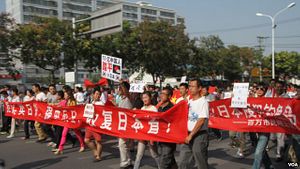At a press conference this past Sunday, Chinese Foreign Minister Wang Yi asked whether Japan will “keep and carry the heavy burden of history,” voicing concerns over Prime Minister Shinzo Abe’s upcoming August 15 shusen kinenbi (End of War Memorial Day) speech. China wonders whether Abe will sufficiently apologize for Japanese wartime atrocities. However, it’s questionable whether this is what’s really best for China.
Let’s be clear: the Mukden and Lugouqiao (or Marco Polo Bridge) incidents, the genocide of over 23 million ethnic Chinese, including the Nanjing and Sook Ching massacres, the gruesome medical experiments of Unit 731, the extensive use of chemical weapons at the battles of Wuhan and Changde, the sexual enslavement of hundreds of thousands of women and the sanko sakusen (the “three alls policy,” i.e. kill all, burn all, loot all) defy comprehension and demand contrition.
Moreover, an apology is not simply consoling, but practical. As Jennifer Lind, assistant professor of Government at Dartmouth College, explains, “Historically, states that have sought to mobilize their populaces for war have crafted nationalist narratives of the past” whereas “a willingness to acknowledge past atrocities signals peaceful foreign policy intentions” and “shows a state’s commitment to human rights.”
In addition, Japanese historical sensitivity is particularly important to its relations with China. “History,” says Dr. Zheng Wang, a regular Diplomat contributor, “is a religion to the Chinese.” Indeed, a 2014 Genron NPO-China Daily poll shows that Chinese respondents consider history one of the greatest impediments to bilateral relations with Japan. When asked “what comes to mind” when thinking of Japan, one of the most common answers from Chinese respondents is the Nanjing massacre.
Furthermore, certain displays of historical sensitivity have previously had enormous impact. The same poll shows negative impressions of Japan have risen from 62.9 percent in 2005 to 86.8 percent in 2014. But against that general rise, there was a marked decline in 2007, when the number dropped to 36.5 percent. In 2007, Prime Minister Abe avoided Yasukuni Shrine during his first year in office and his successor, Yasuo Fukuda, worked to end such visits entirely.
However, Japanese apologies have had no such consoling effect. In fact, many Chinese believe Japan has never apologized. In 2000, Premier Zhu Rongji claimed that Japan has never issued a written apology to China and in the poll cited above, 54.8 percent of Chinese respondents cited the need for Japan to “apologize for its past invasions.” Yet Japanese prime ministers have apologized in a number of different ways — publicly (Nakasone to the U.N. in 1985), recently (Abe in 2014), specifically to China (Tanaka in 1972 and Miyazawa in 1982), actually in China (Hatoyama in Nanjing in 2013) and profoundly (Murayama in 1995).
Murayama’s statement in particular is important. His speech, based on a Diet resolution, was delivered on the 50th shusen kinenbi and included the expression kokoro kara no owabi, emotional wording that literally means “an apology from the heart.” This became known as the Murayama Statement, and has been annually repeated by prime ministers since. Yet according to the same poll, of all postwar Japanese leaders, Murayama was the least recognized.
Recognition of postwar Japanese leaders ranged from Murayama, at 4.5 percent, up to 23.9 percent, with two notable exceptions: Koizumi at 42.8 percent and Abe at 75.2 percent. This suggests Japan’s most apologetic leaders are largely unknown while its most historically insensitive leaders are notorious (Koizumi frequented Yasukuni Shrine while Abe, who delivered the Murayama statement in 2007, made no apologies at the 2013 shusen kinenbi and has even denied war crimes charges). It also suggests Abe is the most recognized post-war Japanese leader, by a huge margin. His actions then, and Beijing’s response, could prove revolutionary.
This brings us back to Foreign Minister Wang’s comments. Most Chinese strongly oppose visits to Yasukuni Shrine; while avoiding Yasukuni sparks outrage within the ruling Liberal Democratic Party’s conservative power base (i.e. Seiwa Seisaku Kenkyukai), improved international relations make this worthwhile. But if apologies will simply be ignored, Japanese leaders have little incentive to take a political hit by facing down conservatives.
Moreover, as Jennifer Lind points out, cries for apology may draw attention to “China’s own egregious whitewashing of history” while excessive shaming could push the Japanese public into the arms of nationalists. Asia Society Associate Fellow Ayako Doi compared this to “arguing that the police should not crack down on domestic violence because doing so might anger the abusers.”
The problem is, politics is not police work. Domestic abusers can be incarcerated but Japanese enjoy freedom of speech and, presumably, renewed Japanese nationalism is not what China wants. More importantly, relaxing pressure regarding apologies, which will go unheard or be discarded as insincere anyway, grants Japanese leaders political leverage when it comes to Yasukuni, which has been shown to actually make a difference in Chinese public opinion. Hopefully, Abe will reaffirm the Murayama Statement this summer, but if he doesn’t, the question then becomes whether China is willing to prioritize realpolitik over its justified grievances.

































